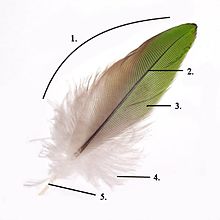vane
Jump to navigation
Jump to search
English
[edit]


Etymology
[edit]FromMiddle Englishvane,Southern Middle English variant offane,fromOld Englishfana(“cloth, banner, flag”),fromProto-West Germanic*fanō,fromProto-Germanic*fanô,fromProto-Indo-European*peh₂n-(“something woven; weave; tissue; fabric; cloth”).
Cognate withSaterland FrisianFoone(“flag, banner”),Dutchvaan(“banner, flag”),German Low GermanFahn(“flag”),GermanFahne.Doubletof obsoletefane(“weathercock; banner”)andfanon.
Pronunciation
[edit]- (UK,US)IPA(key):/veɪn/
Audio(Southern England): (file)
- Rhymes:-eɪn
- Homophones:vain,vein
Noun
[edit]vane(pluralvanes)
- Aweather vane.
- Any of several usually relatively thin, rigid, flat, or sometimes curved surfacesradiallymountedalong anaxis,as a blade in aturbineor a sail on a windmill, that is turned by or used to turn afluid.
- (ornithology)Theflattened,web-like part of afeather,consisting of a series ofbarbson either side of theshaft.
- (navigation)Asighton asextantorcompass.
- (weaponry)One of the metalguidanceorstabilizingfinsattached to the tail of a bomb or other missile.
- Synonym:fin
Derived terms
[edit]Translations
[edit]weather vane—seeweather vane
curved surface radially mounted along an axis
|
ornithology: flattened web-like part of a feather
sight on a sextant or compass
metal guidance or stabilizing fin
Further reading
[edit] weather vaneon Wikipedia.Wikipedia
weather vaneon Wikipedia.Wikipedia
Anagrams
[edit]Czech
[edit]Pronunciation
[edit]Etymology 1
[edit]Noun
[edit]vanem
Etymology 2
[edit]Verb
[edit]vane
Danish
[edit]Etymology
[edit]Pronunciation
[edit]Noun
[edit]vanec(singular definitevanen,plural indefinitevaner)
Inflection
[edit]Declension ofvane
Esperanto
[edit]Etymology
[edit]Pronunciation
[edit]Adverb
[edit]vane
- in vain,vainly
- Ŝi provis flirti kun li, sed estisvane.
- She tried to flirt with him, but it wasin vain.
Related terms
[edit]Italian
[edit]Pronunciation
[edit]Adjective
[edit]vanefpl
Anagrams
[edit]Latin
[edit]Pronunciation
[edit]- (Classical Latin)IPA(key):/ˈu̯aː.ne/,[ˈu̯äːnɛ]
- (modern Italianate Ecclesiastical)IPA(key):/ˈva.ne/,[ˈväːne]
Adjective
[edit]vāne
Adverb
[edit]vānē(comparativevānius,superlativevānissimē)
- in vain,vainly
- "dum bonavanelaudata Pharisaei perierint, et peccata publicani accusata evanueritnt. "Regula coenobialis
- While the good things of the vainly praised Pharisee will perish, also will the sins of the accused tax collector fade away.
- "dum bonavanelaudata Pharisaei perierint, et peccata publicani accusata evanueritnt. "Regula coenobialis
References
[edit]- “vane”,inCharlton T. Lewis and Charles Short (1879)A Latin Dictionary,Oxford: Clarendon Press
- vaneinGaffiot, Félix (1934)Dictionnaire illustré latin-français,Hachette.
Middle English
[edit]Noun
[edit]vane
- Alternative form offane(“flag, vane”)
Norwegian Bokmål
[edit]Etymology
[edit]Noun
[edit]vanem(definite singularvanen,indefinite pluralvaner,definite pluralvanene)
Derived terms
[edit]References
[edit]- “vane”inThe Bokmål Dictionary.
Norwegian Nynorsk
[edit]Etymology
[edit]Pronunciation
[edit]Noun
[edit]vanem(definite singularvanen,indefinite pluralvanar,definite pluralvanane)
- ahabit,custom
- 1957,Tarjei Vesaas,Fuglane:
- Hege hadde for lang tid sidan slutta og bedi han halde seg ifrå denna trøyttandevanen.
- Hege had long ago stopped asking him to refrain from this tiresomehabit.
Derived terms
[edit]References
[edit]- “vane”inThe Nynorsk Dictionary.
Pali
[edit]Alternative forms
[edit]Alternative scripts
Noun
[edit]vane
Verb
[edit]vane
Categories:
- English terms inherited from Middle English
- English terms derived from Middle English
- English terms inherited from Old English
- English terms derived from Old English
- English terms inherited from Proto-West Germanic
- English terms derived from Proto-West Germanic
- English terms inherited from Proto-Germanic
- English terms derived from Proto-Germanic
- English terms derived from Proto-Indo-European
- English doublets
- English 1-syllable words
- English terms with IPA pronunciation
- English terms with audio pronunciation
- Rhymes:English/eɪn
- Rhymes:English/eɪn/1 syllable
- English terms with homophones
- English lemmas
- English nouns
- English countable nouns
- en:Ornithology
- en:Navigation
- en:Weapons
- en:Wind
- Czech terms with IPA pronunciation
- Czech non-lemma forms
- Czech noun forms
- Czech verb forms
- Danish terms inherited from Old Norse
- Danish terms derived from Old Norse
- Danish terms with IPA pronunciation
- Danish lemmas
- Danish nouns
- Danish common-gender nouns
- Esperanto terms suffixed with -e
- Esperanto terms with IPA pronunciation
- Esperanto terms with audio pronunciation
- Rhymes:Esperanto/ane
- Esperanto lemmas
- Esperanto adverbs
- Esperanto terms with usage examples
- Italian 2-syllable words
- Italian terms with IPA pronunciation
- Rhymes:Italian/ane
- Rhymes:Italian/ane/2 syllables
- Italian non-lemma forms
- Italian adjective forms
- Latin 2-syllable words
- Latin terms with IPA pronunciation
- Latin non-lemma forms
- Latin adjective forms
- Latin lemmas
- Latin adverbs
- Middle English lemmas
- Middle English nouns
- Norwegian Bokmål terms derived from Old Norse
- Norwegian Bokmål lemmas
- Norwegian Bokmål nouns
- Norwegian Bokmål masculine nouns
- Norwegian Nynorsk terms derived from Old Norse
- Norwegian terms with IPA pronunciation
- Norwegian Nynorsk lemmas
- Norwegian Nynorsk nouns
- Norwegian Nynorsk masculine nouns
- Norwegian Nynorsk terms with quotations
- Pali non-lemma forms
- Pali noun forms
- Pali noun forms in Latin script
- Pali verb forms
- Pali verb forms in Latin script